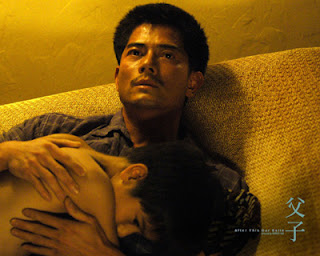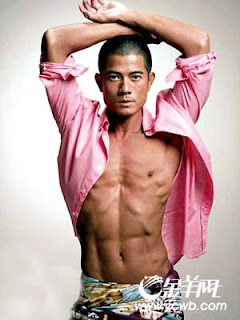May 1st, 2007
Tough Love - Why After This, Our Exile may not play the same way in the western world
SMALL SPOILER MAY BE AHEAD
This feature came to mind when I was thinking about the screening I attended for After This Our Exile at the San Francisco Film Festival. For those not in the know, After This Our Exile tells the story of how a family breaks down due to the actions of an irresponsible father, played by Aaron Kwok, who may be the worst father in Asian cinema since Takeshi Kitano’s character in Blood and Bones. A majority of the audience was non-Asian (or the couple of Asian people I heard talking seemed to sound quite Americanized), and they were just thoroughly shocked at what this guy is capable of. They gasp whenever he hits the kid, when he takes out a knife threatening to cut his fingers off, they even gasp sometimes when he says something bad to the kid. This blogger even calls it a “grueling film to watch.”
But for me, I felt it was actually one of the more gripping Hong Kong dramas in recent years because of the route it takes. Amongst the artsy fartsy Asian dramas coming out these days, I thought After This Our Exile is great in how it finds that balance between entertainment and art. So what’s so grueling about it?
For Asian audiences, one of the bigger surprises was probably how director Patrick Tam transformed this guy:
into this wreck of a man:

Kwok’s character of the father drives the actions of the film - from his wife abandoning her family to his new environment to his son’s final predicament. He is essentially the central character, and of course, he’s the one that’s most hated and feared by the audience. This in itself is already a problem - you have three characters: a mother who abandons her son to live the good life, a father that gambles too much and can’t take care of his own family, and a kid that should probably have known better. By default, the audience probably side with the kid because he’s too young to know better. In Western parenting, a parent ought to be supportive of the kids. Any type of abuse on a child is frowned upon, period. Of course, these basic values are universal, but - and I’m trying to not make a blanket statement about my own race here - there are some exceptions to the rule in the world of Asian parenting.
The biggest form of abuse by the father in the film is verbal abuse - the father yelling at the son whenever he pisses him off, calling the kid “stupid” and many other variations of it. The truth is, kids are raised that way all the time. There’s a familiarity in the way the father acts towards his son because to a far lesser extent, even I got this type of verbal attacks all the time. In Cantonese, a rather popular phrase parents say to the slacker kids is “giving birth to a BBQ pork would be better than giving birth to you.” I know, it seems a lot worse translated, doesn’t it? In fact, almost all the verbal abuse the father throws at the kid seems extremely harsh in English, but they are all familiar insults if you’ve ever grown up under Cantonese-speaking parents who’s lived the hard life.
As for the physical abuse, even the kid gets tired of it and yells back. Was he really getting hurt? Probably, but not as bad as the beating he gets by someone else that’s not his father towards the end of the film. I’m not saying it’s OK to beat a child, but to an Asian audience, smacking the kid upside the head isn’t really anything new in their lives.
What the film shows is an extreme case of such impatient parenting - a way of parenting that hopes to use the idea of conditioning to teach a child how to live. Let the kid make the mistakes, then they’d learn not to do it again to avoid negative punishment. Am I saying it’s the best way for parenting? No. Having been raised on a far lesser version of that, would I call it a traumatic way to raise a child? I would say no to that as well.
My point is this: An Asian audience (and I’m not saying this as a race thing, but as a regional thing) would have an easier time sitting through this film because the abuse shown doesn’t have a real impact on them. To them, the kid isn’t even getting beaten all that badly, or the stuff his father is saying isn’t really as nasty as it could’ve been. In fact, an Asian audience may even find the abuse a little too exaggerated to be taken seriously(Give credit to Kwok to take on such a role, but I thought he was overacting a little bit myself). However, they would still be able to find the film emotionally charged because the father really does some terrible things, but they are much more from his actions towards the end of the film that lead to their final predicaments rather than from the abuse.
But in the West, where child abuse is such a taboo subject on the screen, audiences might be shocked simply at what they’re watching (one person at the Q&A asks whether the kid suffered any psychological trauma from being in the film) right from the get go. And if they can’t get past that, how can they handle the father’s further shenanigans at the end? After This Our Exile is not a film to be taken lightly, that much is true. But is it grueling and hard to watch? That really depends on where you’re from.



May 2nd, 2007 at 11:08 am
I think After This Our Exile is grueling precisely because it is a naturalistic film. Had this been an American film, it would have been heavy-handed and histrionic. I found the naturalism refreshing.
I think American audiences would have a hard time with it precisely because it doesn’t hit you over the head with emotional moments; they just happen.
May 2nd, 2007 at 12:19 pm
i always argued with mum whether “you’re so stupid” in cantonese was rude or not. if we said it in english it was definitely not allowed, but cantonese to her was just an expression. so i totally get what you mean here…
May 2nd, 2007 at 5:50 pm
glenn,
Your comments are dumb. The vast majority of Asian films are so lacking in subtlety it’s not even funny. For every “After This Our Exile” there are 100 comedies where where their idea of “comedy” is to mug endlessly for the camera. Get off your pretentious high horse. It’s not about the racial makeup of the audience, and which is superior, it’s the fact that most movies, Asian or otherwise, are simply unintelligent crap.
May 2nd, 2007 at 6:39 pm
Glenn,
You’re right, “After This…” is certainly more “naturalistic” than the traditional melodrama. I wouldn’t say it’s a western/eastern filmmaking style; in fact, I could easily imagine a story like this in an Asian soap opera as well. I think because of that, it might hit too close to home for American audiences, hence the strong reactions at the screening.
rachael,
Good thing you understand. I was worried I was kind of stretching it.
Anonymous,
You can at least leave your name next time if you’re going to be insulting someone. And I honestly don’t see where the “pretentious high horse” comment came from.